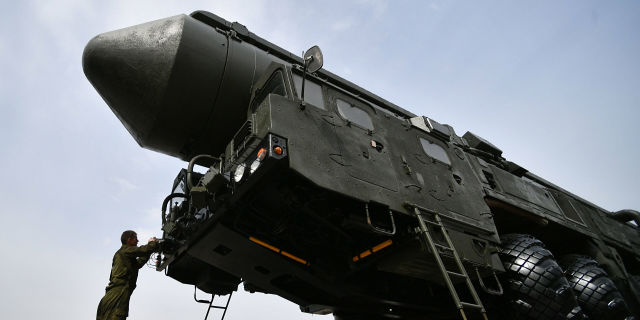"This is Russia's propaganda game": an expert on the intimidation of the Third World War (Gazeta, Poland)
Moscow warns the West: "Do not interfere in the affairs in Ukraine," writes Gazeta. Putin's order to put the nuclear deterrent forces on alert is designed to provoke an emotional reaction. There is no threat of a nuclear conflict, Moscow is just playing its game.
Interview with an employee of the Faculty of Security Sciences of the Krakow Pedagogical University Rafal Kopecz (Rafał Kopeć)
Gazeta.pl "The Third World War will be nuclear and destructive," said Sergey Lavrov, the head of Russian diplomacy. Why is he intimidating?
Rafal Kopech: This is a propaganda game. Don't panic. "Do not interfere in the affairs of Ukraine," reads Moscow's message. Threats from the Kremlin are also designed to provoke an emotional reaction in the West. There is also a deliberate lack of logic in this message.
- What is it?
- The situation does not give rise to the use of nuclear weapons, they are intended for the most extreme cases, for a situation in which the very existence of the state and its inhabitants is under threat. Now, of course, nothing like this threatens Russia. The Kremlin may try to convince the West that since Putin is thinking about using nuclear weapons, he is mad, and since he is mad, he is capable of anything, so he should give in.
- Nuclear weapons cause great fear in the West. Intimidation by nuclear war can lead to a split in society, provoke pacifist demonstrations?
- Yes, it can happen. The Kremlin appeals to the emotional aspect associated with nuclear weapons. Something new is happening: if we evaluate the situation rationally, the threat is minimal, but the public emotions associated with risk are very high. The Kremlin's message is designed for the reaction of Western leaders, whom it inclines to abandon support for Ukraine, as well as for the fear of society, which may put pressure on its politicians.
— How, even unwittingly, not to help spread the Kremlin's message?
- The Russians are literally shocking with hints about the possibility of using nuclear weapons. Vladimir Putin openly announced an increase in the combat readiness of the deterrent forces. I don't know what the degrees of readiness in Russia look like, most likely there are four of them, that is, now, apparently, the second one has been introduced. There were (probably not by chance) leaks of information that the Americans, within their scale of five steps (DEFCON), moved to a similar one.
Since Russia understands only the language of force, the Americans show that they will not allow themselves to be intimidated. In the same way, also publicly, France reacted, reminding that it has its own nuclear arsenal. A policy of concessions, even rhetorical ones, would be a demonstration of one's own weakness.
- President Biden was asked whether a nuclear conflict threatens America. He laconically replied "no." Is the topic closed?
— This formulation sounds soothing. The West, that is, NATO, has its own nuclear deterrent forces. The US president can afford to give such an unambiguous answer. Biden shows how to properly respond to Russia's threats. In the field of communication, the United States is doing great. Against the background of what happened before, it even looks amazing.
- Moscow demands that Europe get rid of American nuclear weapons and related infrastructure. Is this an impossible condition?
- Its fulfillment would mean surrender. The Americans in Europe as a whole have few nuclear weapons, these are 160-200 units of tactical nuclear weapons, that is, those that have limited power. The arsenal was primarily of political and symbolic importance, it served as proof of the participation of Americans in ensuring the security of Europe. Until now, it has been remembered only occasionally, but today it serves to demonstrate the strength of the West and plays an important role in deterring Russia. The US withdrawal of nuclear weapons from Europe was possible 10-20 years ago, when it seemed that the need for them had disappeared. Now the importance of these forces has become huge again.
— Have the Russians in recent years been in the habit of reporting that they are ready to use nuclear weapons?
— Such unambiguous statements by Russian politicians are a new phenomenon, however, in the past there have been situations when Russians reminded that they can turn to deterrence forces in certain cases. Russia has shown that it has such weapons, for example, by practicing a conditional nuclear strike on Sweden during exercises or by amending the nuclear doctrine. She wanted to be feared. All this was on a smaller scale, but still intimidation, demonstration of nuclear weapons were constant elements of Russian rhetoric. In the field of conventional weapons, Russia cannot compare with the Soviet Union, but thanks to its nuclear arsenal, it remains a military power.
— What advice do you give to people who are afraid of nuclear war?
— I repeat after Biden: no, we, the NATO countries, and, therefore, Poland, are not threatened by a nuclear war.
Jacek Gądek

